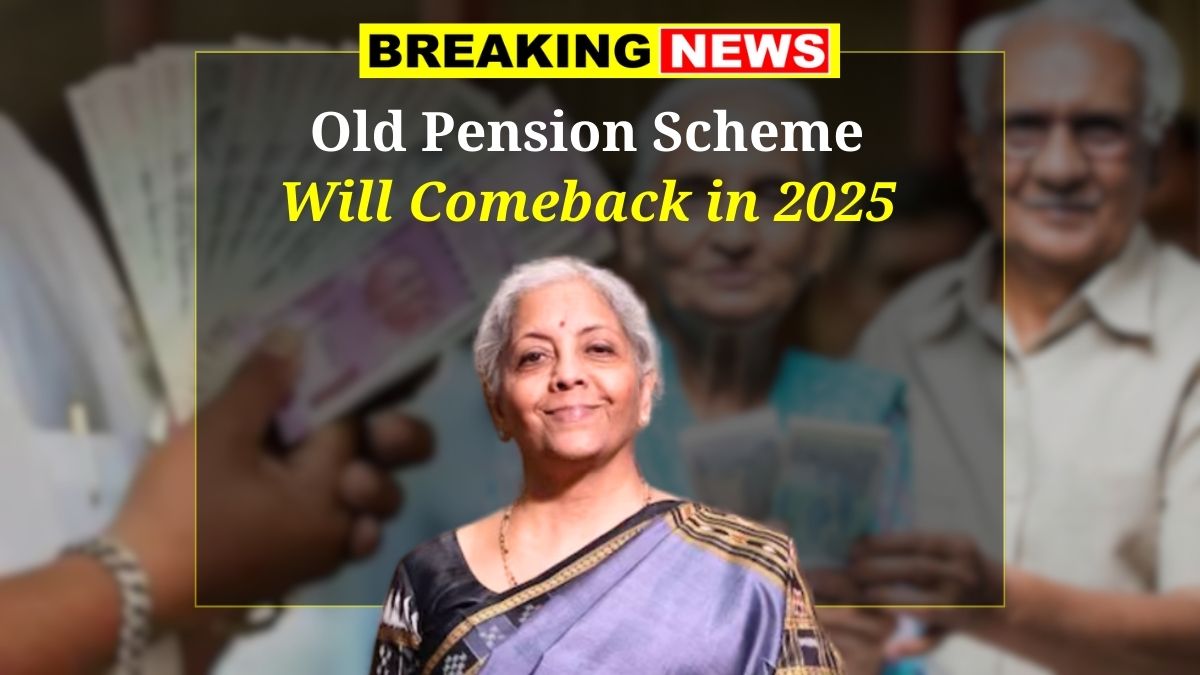Old Pension Scheme – If you’re a government employee, chances are you’ve been asking (or overhearing) this question: “Is the Old Pension Scheme (OPS) coming back?” The buzz around OPS is back in full swing as of May 2025. From office corridors to social media, everyone’s talking about whether the central government will officially revive OPS or not. Let’s break it all down — what’s been happening, where things stand, and what the future might look like.
So, What Exactly Is the Old Pension Scheme?
The Old Pension Scheme, or OPS, was pretty straightforward. It promised government employees a guaranteed monthly pension after retirement. The pension amount was calculated based on the employee’s last drawn salary. For a lot of people, it was a stress-free way to plan for retirement.
But then came 2004. The government replaced OPS with the New Pension Scheme (NPS), which is market-linked. Under NPS, employees and the government both contribute to a pension fund, and the final pension amount depends on how those investments perform in the market.
Since then, there’s been a lot of debate — with employee unions firmly in favor of bringing OPS back.
What’s the Latest Update on OPS in May 2025?
As of now, the central government hasn’t made any big announcement on this. A few discussions have taken place within the Finance Ministry, and the matter is definitely being looked at, but no official confirmation has come yet.
That said, several state governments are already moving ahead on their own. States like Rajasthan, Chhattisgarh, and Himachal Pradesh have already gone back to OPS. Punjab and Jharkhand are reportedly preparing to do the same.
Why this sudden shift?
Because government employees have been protesting. From rallies to strikes, unions across the country have been putting serious pressure on the authorities to ditch NPS and bring back OPS.
What’s the Real Difference Between OPS and NPS?
Let’s compare the two in simple terms:
- OPS (Old Pension Scheme): Fixed monthly pension after retirement. No deductions during service. Pension is based on last salary + DA (dearness allowance). Entire burden falls on the government.
- NPS (New Pension Scheme): Both employee and government contribute. Returns depend on stock market performance. Pension is not fixed — it varies. Offers good growth potential but also involves risk.
So which one is better?
Well, that depends on who you ask. Employees prefer OPS for the peace of mind it offers. Economists and financial planners, on the other hand, worry about the long-term financial strain OPS places on government budgets.
Many experts now believe a middle ground should be explored — maybe a hybrid model that offers both safety and flexibility.
Will OPS Actually Be Implemented Again?
There’s no official answer yet, but the government is certainly under pressure. Given how many states are already adopting OPS again, there’s a growing sense that the centre might eventually follow suit, perhaps with some adjustments to keep the financial impact in check.
There’s also talk that the central government might make a big announcement sometime soon. So, if you’re in government service or planning to join, it’s worth keeping an eye on the developments over the next few weeks or months.
What Should Employees Do Right Now?
At this point, it’s a waiting game. No need to panic or jump to conclusions.
Here’s what you can do:
- Stay updated with verified government circulars or announcements.
- Keep communicating with your union or association.
- Avoid spreading or believing in fake WhatsApp forwards.
- Discuss your options with a financial advisor if needed — especially if you’re nearing retirement.
Final Thoughts
There’s no doubt that OPS has sentimental value and practical appeal for many government employees. While some states have already brought it back, the big question is whether the central government will do the same — and on what terms.
For now, we wait. But the conversation is far from over.
Disclaimer: This article is for informational purposes only and should not be considered financial or legal advice. The content is based on publicly available information and may not reflect the most recent developments or official notifications from the Government of India or the Ministry of Finance. Pension policy decisions are subject to change, and any action based on this article should be taken only after consulting with a qualified financial expert, official government channels, or your department’s HR authority. Neither the author nor the publisher is responsible for any decisions made based on this article. Always refer to official sources such as PIB, IRDAI, EPFO, or the Department of Pension & Pensioners’ Welfare before making any financial commitments or assumptions.






